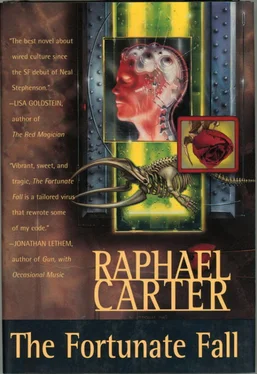Raphael Carter - The Fortunate Fall
Здесь есть возможность читать онлайн «Raphael Carter - The Fortunate Fall» весь текст электронной книги совершенно бесплатно (целиком полную версию без сокращений). В некоторых случаях можно слушать аудио, скачать через торрент в формате fb2 и присутствует краткое содержание. Город: New York, Год выпуска: 1996, ISBN: 1996, Издательство: Tor Books, Жанр: Киберпанк, на английском языке. Описание произведения, (предисловие) а так же отзывы посетителей доступны на портале библиотеки ЛибКат.
- Название:The Fortunate Fall
- Автор:
- Издательство:Tor Books
- Жанр:
- Год:1996
- Город:New York
- ISBN:0-312-86034-X
- Рейтинг книги:3 / 5. Голосов: 1
-
Избранное:Добавить в избранное
- Отзывы:
-
Ваша оценка:
- 60
- 1
- 2
- 3
- 4
- 5
The Fortunate Fall: краткое содержание, описание и аннотация
Предлагаем к чтению аннотацию, описание, краткое содержание или предисловие (зависит от того, что написал сам автор книги «The Fortunate Fall»). Если вы не нашли необходимую информацию о книге — напишите в комментариях, мы постараемся отыскать её.
“Gripping…. One of the most promising SF debuts in recent years”.
—“Publisher’s Weekly” starred review
The Fortunate Fall — читать онлайн бесплатно полную книгу (весь текст) целиком
Ниже представлен текст книги, разбитый по страницам. Система сохранения места последней прочитанной страницы, позволяет с удобством читать онлайн бесплатно книгу «The Fortunate Fall», без необходимости каждый раз заново искать на чём Вы остановились. Поставьте закладку, и сможете в любой момент перейти на страницу, на которой закончили чтение.
Интервал:
Закладка:
“Finally, one afternoon when I had given up and was on my way out, I passed her in the foyer. She was talking to a friend, some one on the Student League. I was almost at the door by the time I saw her, so I stopped and went back to the book return, as though I had forgotten something. I pulled out Aeschylus, took the leaflet from him, and, even though he was not a library book, I dropped him into the return slot. So much for the classics; I never saw him again. Then I opened the leaflet, as if I had just noticed it there, and stood for a while pretending to read it. She glanced at me for one instant—that was all it took for her to understand—and, quickly but unhurriedly, took leave of her friend. She walked out and, cautiously, I followed her.
“She led me all the way across campus without acknowledging my presence, and after a while, I began to think she hadn’t noticed me at all. Then suddenly she was nowhere to be seen. I stopped, looking around. But to stand there craning my neck like that was too suspicious, so I started to leave. As I did, she reached out for me and pulled me back behind the shrubbery where she was hiding. She pushed me against the wall and covered my mouth with her hand.
“‘Never call me Catharine,’ she hissed. ‘Don’t even think of me by that name. Only Katya—you understand?’
“I nodded as best I could with my head pinned to the wall. She took her hand away from my mouth and said, ‘Now tell me why you’re smart enough not to approach me, but not smart enough to burn your leaflet.’
“I reached into my pocket, as she watched me warily, and took out the leaflet to show her. On the cover where Katya’s subtitle should have been, I had written, ‘Paper due 11/IX Greek.’
“She looked at me differently then. ‘It’s about time the gods sent me someone with half a brain. You won’t be too bad once we get your head out of the clouds.’
“‘There are others?’ I said.
“‘Well, of course there are others. You don’t think that some floatheaded Classics major was the first person I went after? I wouldn’t have bothered if not for that horrible cap—I hoped you were hiding a socket under there.’
“I took the cap off to show her.
“‘Sense and a socket. More than I’d hoped for. Come to the coffeeshop in the Student Union at seven tomorrow.’
“‘You meet in a public place?’
“‘Someone will lead you from there to where we meet,’ she said impatiently. ‘Come, and for God’s sake don’t use your real name. For us you will be—’ she stopped and looked at my blue-and-green cap again. ‘I don’t have my language chip in. What’s a peacock in Russian?’
“‘ Pavlin, ’ I said, looking down in embarrassment.
“‘From now on you are Pavel. Paul—a nice biblical name for a four-nine atheist.’
“‘I’m not an atheist!’
“‘You will be,’ she said, and she broke through the hedge and was gone.”
He paused to take another bite of pirozhok and chewed it slowly, remembering. I had been ignoring my food and was beginning to get hungry, but again I had to fill in with a question:
“If your name was changed to Pavel, what was it before?”
“Stepan Sornyak. But I’ve been Pavel for a long time now.”
A strange surname—stranger, really, than his adopted one. And he’d called himself an ethnic intellectual; the Guardians didn’t usually apply that term to Russians. Iudey, perhaps? Or cigan, given his mention of Tarot? It was possible; he had a wanderer’s eyes. But if so, why had he sunk his ethnic noun-name in the strange but clearly Russian Voskresenye?
“Was it Katya who named you ‘Sunday,’ too?” I asked. “More atheist irony?”
“No. That name came later. —Of course you will alter the names before the interview is Netcast?”
“Yes, of course,” I said. “Why did you change your surname?”
“I did not,” he said simply, putting the last crumbs of pirozhok into his mouth. I took the opportunity to steal a bite from my sandwich. My question could wait; but I made a note not to forget.
“At first Katya insisted I keep up my schoolwork, to avoid drawing attention to myself. But soon we both realized that my slipping grades only confirmed what everyone had expected of me all along, and I began to skip classes with abandon. Instead of Homer, I read Katya’s leaflets. Instead of writing papers, I altered records at Square-Mile-on-Volga. Instead of attending classes, I fed escaped prisoners on their way to Africa. I cut my hair short, grew my beard, traded my hideous cap for a black one that would be less visible at night, learned to shoot a gun—for though we did not use weapons, Katya insisted we be ready to—and stopped eating animals—for she insisted we practice compassion toward all creatures, even the lowliest. Within a month, my life had changed so much that everything that had come before seemed like a dream.”
“And did you become an atheist?”
He laughed. “No; that was the one thing in me she did not change—not entirely. Although, since it was the Catholic Church that most often gave sanctuary to fugitives, I did trade my Old Slavonic mass for Latin.”
“How much resistance was there, in all?”
“You mean numbers of people? A few thousand in Russia, I suppose. It’s hard to say. Communication was poor, and coordination nonexistent. Not enough to loosen the Guardians’ grip on power, by any means. At best, we were a very minor annoyance. We spared them the trouble of killing a few of their prisoners, by sending them on those ridiculous treks to Africa. Moscow to Riga is a hell of a hike, and from there no easy trip to Casablanca; I doubt any of them made it there alive.”
“Did you know that at the time?”
“Katya and I did, yes. We tried to let the others think that they were doing a little good, but it must have been obvious. A resistance can support the attack of an army, but there was no opposing army then; or it can mobilize the people, but not when the slightest uprising is instantly crushed. We would have needed to strike with ten thousand even to hold out long enough to gain new recruits; and yet for us it was a major undertaking to contact a band of dissidents thirty miles to the north. It was useless.”
“Then why bother?”
For the first time, he would not meet my gaze as he spoke to me. “Because it made us feel a little better,” he said at length. “We could not save even one innocent from the Guardians, not for long. But we could declare our opposition. We could go on record, however secret a record, saying that we did not condone the Square Miles—that we did not accept the subjugation of our people. And also, she said, we could be ready. She believed that one day something, she did not know what, would come to challenge the Guardians. She always had much more faith in that than I did. And of course she was proved right, though when the Unanimous Army finally came, it hardly needed a resistance to support it. Besides, by that time everyone in our group, except for me, was dead, and I was scrubbing bottles for Derzhavin.”
“If Katya was so careful,” I said, “how did you get caught?”
“Katya was a victim of her own success. It took her at most a week to study a person, understand him, and devise just the words, just the gestures, just the intonation, just the words on a leaflet, that would make him one of us. She never once failed that I knew of. And so, inevitably, she came to the end of her A list, and started on the second choices. Eventually she came to the one that brought us down.”
“He reported you?”
“Oh, no. Quite the contrary, he was the most zealous of us all.” He frowned down at his empty plate. “I remember that when she renamed him, as she did everyone, she did not give a reason, as she always had before. Afterward, when I asked her why, she said, ‘I named him Piotr because he’s as dumb as a rock, and if we don’t look out, he’ll sink us like a stone.’ She knew from the beginning.
Читать дальшеИнтервал:
Закладка:
Похожие книги на «The Fortunate Fall»
Представляем Вашему вниманию похожие книги на «The Fortunate Fall» списком для выбора. Мы отобрали схожую по названию и смыслу литературу в надежде предоставить читателям больше вариантов отыскать новые, интересные, ещё непрочитанные произведения.
Обсуждение, отзывы о книге «The Fortunate Fall» и просто собственные мнения читателей. Оставьте ваши комментарии, напишите, что Вы думаете о произведении, его смысле или главных героях. Укажите что конкретно понравилось, а что нет, и почему Вы так считаете.












